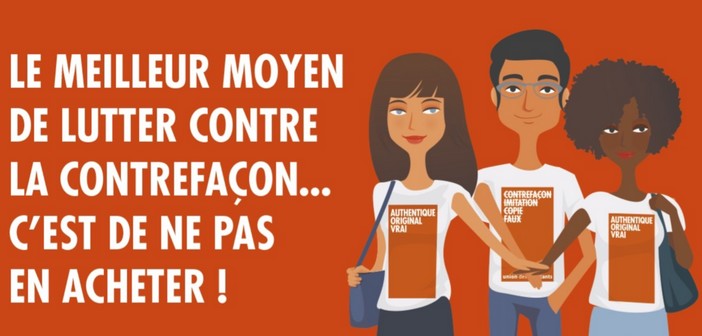Thursday, July 16, marks the launch of the 12th summer awareness campaign against counterfeiting. Gathered at the Nice Opera, political, judicial, and associative leaders highlighted the consequences of this scourge and the means to combat it, emphasizing two key points: the threat posed by the web and the damages, both human and economic.
8.8 million items seized (excluding cigarettes) in France in 2014, a 15.7% increase compared to 2013. More than one and a half million came from online commerce. This is the assessment made by the Union of Manufacturers (Unifab). The association groups over 200 companies and fights against counterfeiting, an illicit activity that has “become globalized and industrialized,” according to Unifab’s Vice President, Philippe Lacoste.
The threat affects sectors ranging from automobiles to textiles and cosmetics. The internet is partly to blame. Consumers don’t hesitate to shop in front of their computers, purchasing clothing, toys, and food. Marie-Catherine Kuntz Pinguet, regional director of the Nice customs, displays e-commerce medicines seized between April and June 2015. “They were without instructions, without contraindications, and sometimes packaged in plastic,” she details. She emphasizes the pernicious side of this practice which does not care for the consumer: “The only goal of counterfeiters is profit.”
In this context, General David Galtier, from the National Gendarmerie, places counterfeiting in the realm of organized crime. The fight against what he calls the “plague of modern times” involves two approaches. Raising awareness among residents and tourists, as on the beaches of La Turbie on July 10 and 11; and taking the fight to the web. The judicial hub in Cergy-Pontoise centralizes cases dealing with cybercrime, “an area of work that must be developed,” he states. Operations have already been conducted, such as the seizure of counterfeiters’ money: over 20 million euros recovered by the 450 investigators dedicated to this criminal sector.
“So many opportunities to be duped while trying to get a good deal” (Mr. Lacoste)
While judicial authorities are the main force in stopping criminals, consumers must also do their part. The first deputy mayor of Nice, Philippe Pradal, appeals to “everyone’s sense of responsibility.” This means that looking for the best price should not be done at the expense of one’s health or life, such as with a cheap but faulty brake pad. He takes the opportunity to announce the establishment of a summer brigade of 200 officers, in addition to the existing forces. Philippe Lacoste praises the awareness campaigns that “educate and help understand potential dangers” to health, but also to the economy.
Counterfeiting harms industries, with a significant loss of income. More than 6 billion euros did not enter the state coffers in 2014. Locally, street vending in Nice is now a crime. Although Grasse is the capital of perfume, this market is not spared. Ms. Krutz Pinguet warns against “toxins found in some bottles” and promotes a heritage to be preserved. To protect businesses and their capacity to innovate, the National Institute of Industrial Property (INPI) is committed to this fight using new technologies (Internet, 3D printing). Its manager, Eric Catapano, discusses other tools such as the option, with the law of June 4, 2014, to register the geographical data of manufactured products on the INPI site. This leads to the promotion of the heritage and know-how of businesses.


